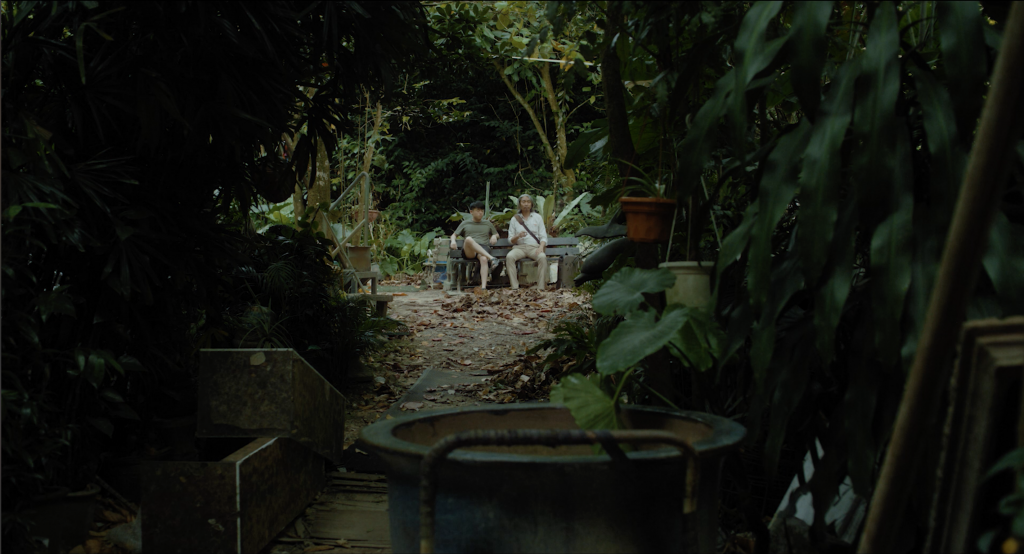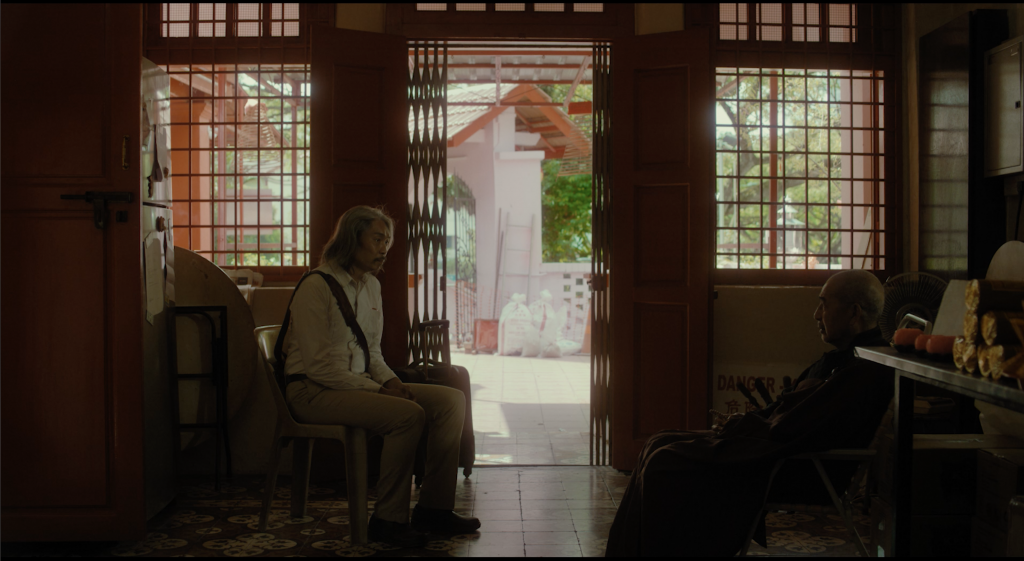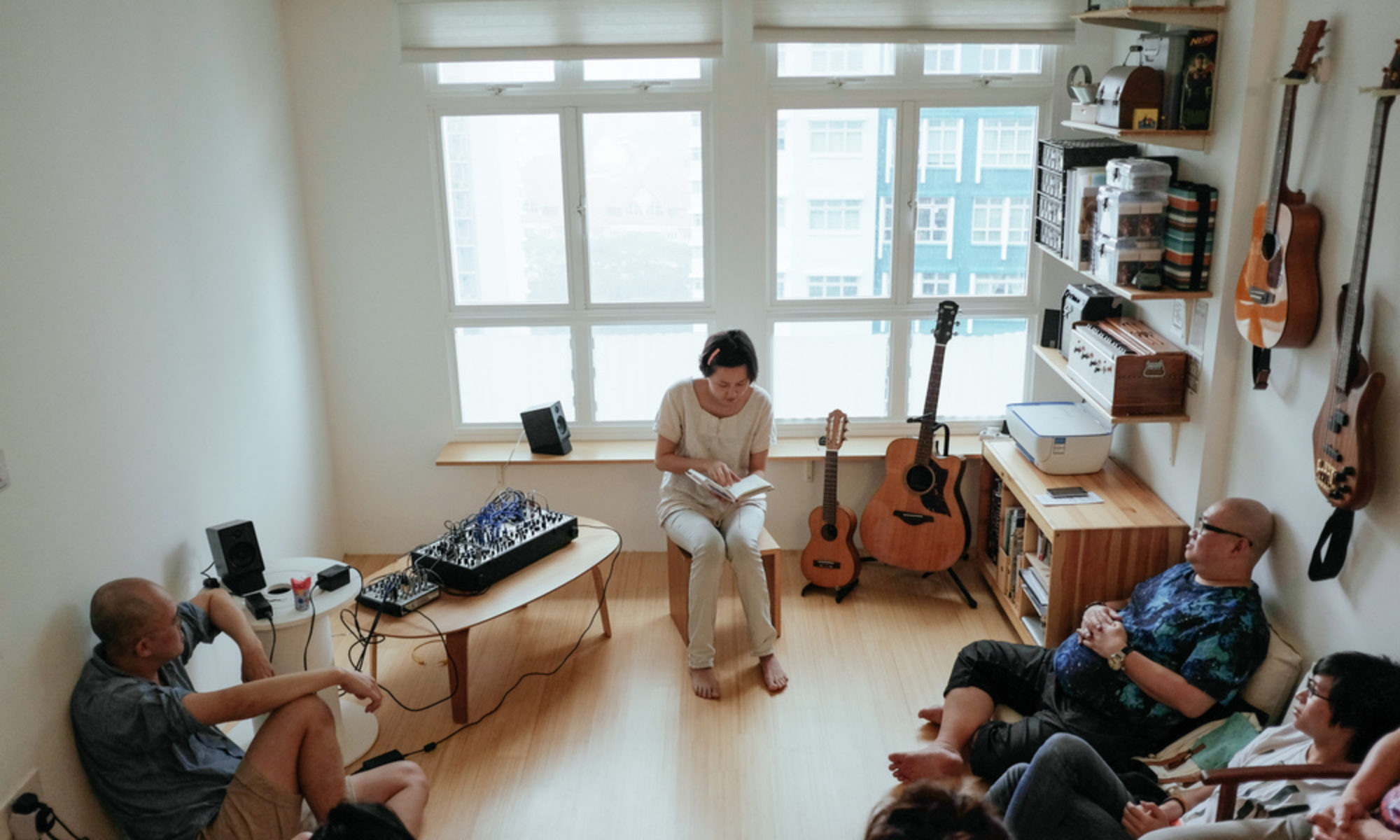
Joshuah Lim En (b. 1995) is a filmmaker who is intrigued by time and transcendence. He has always regarded film as a medium that has the ability to contain the intricacies of the human journey rather than as just a group of moving images. Some of his recent works have explored topics close to his heart: social disconnections, spirituality, the decay of culture, and loneliness. His recent films were screened at the Singapore International Film Festival and the National Youth Film Awards.
In this interview, Jonathan and Joshuah discuss filmmaking as a medium, the influence of transcendental style of cinema on Joshuah’s work, and the relationship between Joshuah’s faith and his filmmaking. It has been edited for length and clarity.
Jonathan: How have you seen your faith guide you as you’ve along this path of being a filmmaker?
Joshuah: I was born into a Christian family. My dad used to be an elder in a church. In my youth, I would say that I was quite on fire for God. I had cancer, and after cancer, I wanted to go to Bible school and become a pastor, but my dad told me to wait. I had this passion for film at the same time, but it wasn’t really film as we know it. It was more of moving images and videos.


At that time I thought that Bible school was the way to be called and then you go full-time in church. But I felt that was the easy way out. That was me trying to escape my real calling. So I said okay, I’ll give myself at least three years in uni to do film and be secular and figure this out. And then if God calls me back to the church, He will call me back to the church. I’m saying I’m not on fire for God right now, but it’s just that the passion has, I think, evolved in a different way.

But I think only now, after maybe my third film, have I been able to see God in the work that I do.
Jonathan: Which is your third film?
Joshuah: It’s called And They Roamed. It’s actually about two lesbian girls who want to commit suicide in a school. Then they find a ghost and she brings them around the school, and they find the rope with which she killed herself, but they also relive their childhood memories in this abandoned school. I remember asking God, what’s the position I should take in that film.
It was tough because I wanted to make a film about suicide and homosexuality, but I was also conscious of the spiritual climate of the church at that time. The sentiment was quite angry and opposed to those who are gay or lesbian. I remember thinking about it and going into what was human about that film and about these characters. I think that was a process that allowed me to see God in the work that I do.


At the end of that film, I realised something: film is not the Bible. It’s like an instrument in worship, you know, it can create the environment of holiness. It can create an opportunity, but it is not inherently God. I came to the conclusion that film is not sacred, but it can replicate that sacredness. It can bring us to that position of sacredness, and that was always its purpose.
So I saw that human aspect of filmmaking, that if I wanted to be a filmmaker and a Christian, I could not make it so black and white. It doesn’t work that way. My mindset right now is that film is like the fruit that comes out of me and if I align myself to God, the fruit should be good. But if I don’t align myself to God, it should be bad. And trust me, there are bad fruits that come out of me also.
That was how I think filmmaking integrated with my spiritual walk.
Jonathan: That’s definitely a valid part of what it means to be an artist because as you alluded to, there is a danger that the practice or the medium itself becomes a form of idolatry, and that idolatry is not recognised as idolatry.
Joshuah: Yeah, and I don’t think it’s contained to the arts only. I feel it’s across the church. But for the rest of the departments, whether it’s worship or Bible study or preaching, they can hide behind what is actually really sacred. That blindness is even more dangerous. It’s harder to find what’s edifying because everything looks edifying. You need to go through a second layer to the intention behind it. But for film, we have the privilege of going against what is sacred. In a way, it’s easier to spot what’s holy and what’s not holy when it comes out in a film.
It’s like what Andrei Tarkovsky said, filmmaking basically serves the message of the film only. And that message is not God. I don’t think it will ever be God because God is God and the message of the film itself is inherently secular to a certain point. But can that message bring a sense of the divine, bring a sense of transcendence?
I do believe so! Like the old paintings of Jesus, how when you look at them, it’s okay to feel that holiness and be like, hey, it’s beautiful. You know, I feel like I’m closer to God. But it’s not okay to go and be like, oh my gosh, that painting is the source of the holiness because that’s basically saying that painting is an idol. That’s the position that I try to take with filmmaking.
Jonathan: As you were speaking that had me thinking a lot about Paul Schrader and the kind of thinking that goes into his films. His films toy and engage with the idea of Christ, what is compelling about Christ, but at the same time, he doesn’t lapse into moralising or preaching. So if you think about First Reformed (2017), for example, or even Taxi Driver (1976).
As you were speaking about that process of recognising film as a medium that is not inherently made sacred, I was thinking about your process of going from the media team in church to learning from Tarkovsky and Schrader. How was that for you?
Joshuah: For me, I struggled because I felt that media and art are two different things. Like the need to record a sermon and the need to make a film about a sermon are two different things. I think for church right now, I have yet to experience a ministry that is really for artists just doing art. My main struggle was that I was trying to do things that were too different, that were not like the conventional way of doing a short.
Film school was what helped me understand the transcendental style of cinema. I was doing critical film studies and reading about early filmmakers like Robert Bresson and Yasujirō Ozu and realised that the form of slow cinema itself has an idea of waiting. You know Ozu has Zen Buddhism as his backbone for his films, where everything’s connected. That’s why you’ll see a shot of like a vase, and then you’ll just stay on the shot and hear the dialogue going over because it implies that in that frame, the vase is connected to the characters as you are to the vase to the characters.
Then for Bresson, there’s always the three aspects. There’s the everyday that’s established, which is the reality of life. Then you’ve got the disparity, which is this tension between man and environment, which is a very Christian thing, like, God and man never being able to but always trying to come together. And there’s that holy suffering that you go through. If you watch Diary of a Country Priest (1951), you kind of see that, and it’s even a physical ailment – he cannot drink anything, he can only drink wine. And the third aspect is stasis, which is the idea that through the suffering, there’s always this icon that transcends, the cross, for example. It’s no longer that the cross is just like a symbol of the cross. It has a deeper meaning because of what we give it to be as the audience.
So I think I’ve actually found God in film school. I found God in film in film school. I know it’s strange because I do watch a lot of types of films and give credit to everything, but my passion for film was reignited when I watched Bresson and Schrader and I was just like, huh, that’s interesting. It’s things like that: they made me realise that God does exist in this industry.
Jonathan: That’s interesting though because that gives the sense that coming to film school gave you the language to articulate what you were searching for in your craft, the theoretical backbone. It gave you the scaffolding, maybe mentally, intellectually, that you needed to grow in your style and recognise, these auteurs’ connection with some kind of transcendence or divinity. That sense of waiting, the stretches of time, the immanence, the sense of connection of it.
Joshuah: Yeah, that pain we put our audience through. I totally agree. Slow cinema is where I found more of God, where I experienced more of his characteristics because it reflected my process, my own spiritual journey with God. The idea of waiting for an answer that you don’t know. And some of the slow cinema films, sometimes there’s actually no good ending or bad ending. There’s just an ending.
That kind of reflects my spiritual journey with God. Sometimes you ask Him a question and you just wait and wait and wait. And then you realise that maybe the whole point is just that wait you had to go through, like King David and his anointing and how twenty years later he was still not the king. And for our generation in modern-day Singapore, everything is so fast. You realise that some things are not meant to come now, some things are meant to come like five, ten years later. We don’t water those things. We don’t have the patience to wait and groom them. That was a process that I had to go through.
And I think that is reflected in the film I just did, Gone are the Moat and the Walls. If you watch that film, the protagonist Zhang is actually a disjointed man. I really wanted that perspective of a spiritual man in modern Singapore, like how foreign everything is. We start in a cityscape and we end in the forest and every scene gets more isolated from the city. With every new person he meets, it’s almost like they’re telling him that God doesn’t exist anymore. That’s the subtext: no one has time for God.

Even though I chose to make the film about Taoism and Buddhism, which I like because of their physicality, that was how I felt as a Christian at the time. In every conversation I had, it was like I was having a conversation with the fortune teller in the film, which is basically about how there is no God. And there’s the monk who is like, yes there’s a God but there probably won’t be in the next five, ten years. Or the son, who is basically a representation of the next generation who say, I see the impact of religion, but I just want to gain back the connections I’ve lost with my family, which are all side effects of the degradation of religion.
That was my treatment for that film, which was damn tough because I didn’t get the ending right. I feel that the film was the most spiritual film that I’ve done in a long time.
Jonathan: I think Henri Nouwen talks about how the paradox of faith is that you are made more conscious of God when you are most aware of His absence. And it is in the sensation of the absence of God that is the period of waiting. For a lot of people, that period of waiting is the season that is most discouraging. People talk about dryness, being in the desert, going through the motions, not getting anything.
And to find something that mirrors that for you, that was slow cinema. I think it’s interesting that you took that as an affirmation of your spiritual walk as if to say that this is part of what it is to be a believer. Maybe that was what resonated with me as well about the film. It’s that sense of that slippage out of Zhang’s hands, right? The feeling of a world that he once knew, I guess not just a physical world, but a transcendent, ethereal world that everyone was losing touch with. I think the way that is literalised in your film – the gods only speak Hokkien, so no one can speak to the gods anymore – that was such a powerful display of what it means to have that connection severed.

Joshuah: Language for that film was big because it started with this pretence of how do we communicate with the gods? In the film, there are Chinese puppetry shows that are done in service of a god, like they give thanks to a god, put on a show, and speak Hokkien. And then what happens is that because of the Speak Mandarin campaign in Singapore, no one speaks Hokkien anymore because we’re trying to globalise everything. And what happens is that these youths including myself – I don’t speak Hokkien, I don’t even speak Mandarin – don’t understand, and the tradition begins to die.
And in a way that was something about how Taoism and Buddhism, because of the physicality, rituals, and performances, have a strong cultural backbone. When the undercurrent of modernisation erodes this backbone, you are left with a shell. That’s something Zhang is facing; he’s facing a generation that does not understand Hokkien or who this god is. To him, that’s the scariest thing that could happen.
In a way, that’s also my critique of Christianity, because I feel like now, being a good Christian means going to church, doing missions, helping the migrant workers, and I’m not critiquing, that’s good. But this undercurrent of materialism, self-centeredness, fear of pain, fear of suffering, kind of eroded away some of the spiritual backbones that Christianity has, which are long-suffering, patience, obedience, truth. It’s eroded and what we’re left with is a church that is kind of just a shell. That’s a whole new film I would love to do honestly
Jonathan: That’s a good transition to talking about what it would look like to make that film. In your mind, the film about Christianity that is still swirling, do you have a sense of how that might take shape?
Joshuah: I feel like truth is what I aspire to replicate. I’m not saying truth in the sense of factual truth, but spiritual truth in a way, or at least minimally a piece of me that I identify now in my season in my life. I think that’s how we make films that are God centred.
I feel like if we as artists were… I wouldn’t say supported but had more backing with the church, and we could be honest with this process, I feel that we could make films that can minimally connect to the audience on the human level. When we can at least connect with them with the idea of seeking, the question we’ll ask will be what are they looking for? And I think that is enough of a spark because that’s when the other ministries come in because you’ve got your pastoral care, your outreach, your worship.
But for me as a filmmaker, it’s first doing something really personal, and that’s between me and God. That’s my prayer la. For Gone are the Moat and the Walls, Zhang is me. I have a spiritual background and it is becoming like a distant memory, and I’m trying to find where this God is that I remember in my youth. That is basically what Zhang is finding – the city god he worshipped and prayed to when he was younger. So that was the prayer that was converted into a film.

Jonathan: I like what you’ve said earlier about your creative work as the fruit of your walk. I think what you just verbalised was alluding to that: how it is part of the outflow of the intimacy with God. Even locating prayer as the kind of heartbeat of the process, not simplistic prayers or platitudinous prayers, because I see that a lot in the writing I try to undertake. When you’re trying to get to the truth, you are not trying to bypass suffering, doubt, or anguish. And those experiences cut across, like you said, almost all people, in some shape or form.
To build off of that, what are some hurdles that you see in making that film about Christ?
Joshuah: The first struggle is that the church is so big and so divided. If I do a film about a church, I have to understand that maybe the church won’t like it. That’s the first thing that I have to let go of, though part of me would want the church to like it and want it to resonate because it’s out of Christendom.
The second struggle I have is that when you make a film about Christianity and it cuts so close to you in a very direct way, you don’t have a mask anymore. You’re not hiding. You feel this duty to do things. You have more of a higher responsibility. There’s always that question that comes in: do the films that you make stumble people, do they make people go further away from Christ or closer to God? And then if it’s like further away from Christ then why do you do it? Then the next question I’d ask myself is how do we define it? What’s the sample size? You know, maybe out of ten, two people find it stumbling and eight people find it edifying. Does that mean I fail or pass?
I came to the conclusion that the only way I can do this right is by ensuring that my posture is right. Like I’m really spiritually in tune with God. And I’m not sure if I’m there yet. I wouldn’t dare say that the past two films were you know, God-ordained. I think the best I can do is make sure my posture is right first, then make the film, which is something I struggle with because how do you know your posture is right as a Christian in the arts?
I think the climate we’re in is even more hostile as well. Like the trends of filmmaking, it makes it even harder because now you’ve got to go against that but at the same time, you’ve got to make sure you don’t piss off your own camp. I think the next film that I do will not be about God. It will probably be more explicit about spirituality and suffering and severance. I think it’ll actually take four or five more films before I can actually say ‘this is for you God’ if I ever get there.
And even as an independent filmmaker in Singapore, that’s already hard. I’m working in a creative agency, and I love my job, but it does hit you sometimes. Like you don’t have a producer, you don’t have money, you don’t have a crew. I’m not that rich to just spend 50k. So in a way, there’s that fear of not doing that. I’d always thought that maybe Gone are the Moat and The Walls might be the last film I’ll ever do.
I do hope to make a new one, but the thought does come into my head like maybe this is the last one, but I’m still writing, so hopefully.
Watch Joshuah’s films Chiak (2017) here and Peanut (2019) here. Watch the trailers for And They Roamed (2020) here and Gone are the Moat and the Walls (2021) here.


